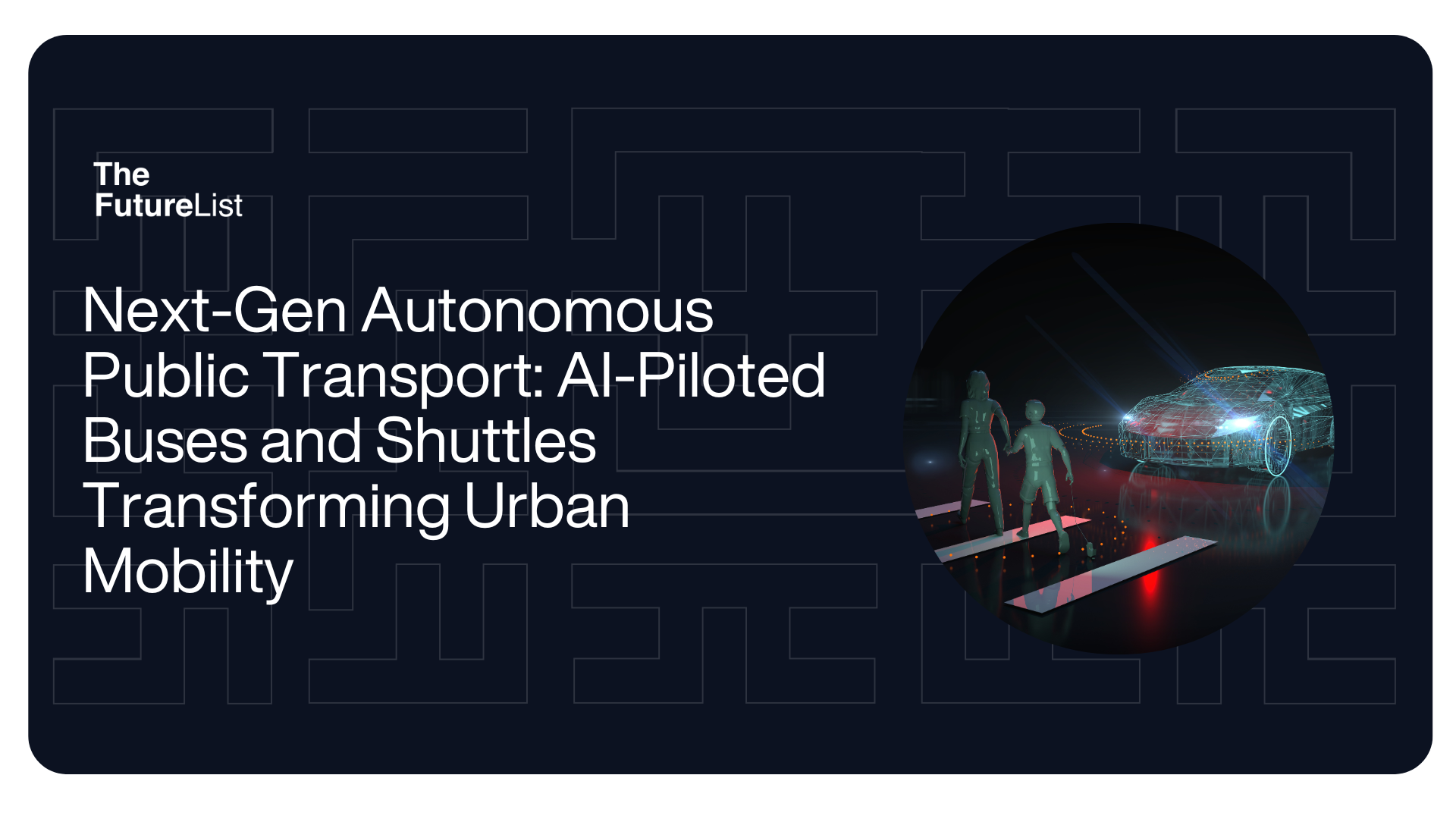
Next-Gen Autonomous Public Transport: AI-Piloted Buses and Shuttles Transforming Urban Mobility
By Della Asiko
As urban centres battle with issues of congestion, sustainability, and the evolving demands of commuters, the advent of Next-Gen Autonomous Public Transport emerges as a solution that could change the dynamics of commuting. Around the world, the integration of autonomous technologies into public transport is reshaping the very fabric of urban mobility. In today’s Innovation Snapshot, we explore cutting-edge developments in autonomous public transport and how AI-driven buses and shuttles are fundamentally changing the dynamics of commuting and propelling cities into a new era of transit possibilities.
This snapshot highlights 3 innovative companies propelling cities into a new era of possibilities.
Waymo
Waymo, founded by Anthony Levandowski and headquartered in California, stands as a trailblazer in the autonomous driving technology sector with a profound mission to redefine mobility by making it safe and effortless for people and goods to navigate the world. At the heart of their innovation is the Waymo Driver, a groundbreaking autonomous driving technology that serves as the cornerstone of the industry. Unveiling the world’s first fully autonomous ride-hailing service, Waymo sets a new standard for public transportation, available 24/7 and designed to elevate the passenger experience. The Waymo Driver epitomises true autonomy, eliminating the need for a human driver and ensuring safety from pickup to destination. Unlike mere ‘self-driving’ features offered by others, Waymo’s technology doesn’t rely on a human driver behind the wheel, allowing passengers to relax and enjoy the journey without the constraints of a traditional driver. By prioritising safety and removing the risk factors associated with human drivers, Waymo is ushering in a new era of fully autonomous transportation that is reshaping the future of urban mobility.
EasyMile
EasyMile is a key player in autonomous mobility solutions, is revolutionising driverless transportation for passengers and goods. EasyMile was founded by Gilbert Gagnaire and has its headquarters in Toulouse, Paris. At the heart of their innovation is a robust suite of solutions that spans the spectrum of mobility and intralogistics, showcasing the versatility and scalability of their autonomous technology. Collaborating with esteemed manufacturers, EasyMile’s commitment to delivering tangible services is evident in its global clientele. With a deployment of vehicles in over 400 locations worldwide, EasyMile is rapidly accelerating its commercialisation, proving its transformative impact on global mobility.
The technology’s prowess is highlighted by its ability to recognise and respond to elements like stop signs, pedestrians, and lampposts, showcasing advanced capabilities. EasyMile’s software seamlessly interacts with next-generation radars, cameras, and lidar sensors, providing a real-time, 360-degree view of the vehicle’s surroundings. This holistic approach to data processing ensures that autonomous vehicles equipped with EasyMile’s technology can independently handle a majority of driving situations.
Aurora
Aurora was founded in California, 2017 by Chris Urmson, Sterling Anderson and Drew Bagnell. It is at the forefront of advancing self-driving technology, committed to delivering its benefits safely, swiftly, and to revolutionise transportation. Central to their innovative approach is the Aurora Driver, a versatile self-driving system meticulously designed to operate across various vehicle types, spanning freight-hauling trucks to ride-hailing passenger vehicles. Anchoring Aurora’s driver-as-a-service products, Aurora Horizon and Aurora Connect, the Aurora Driver serves as the technological backbone, offering a unified hardware and software core capable of adapting to an array of vehicles. At the heart of the Aurora Driver is a vehicle-agnostic, high-speed computing platform. This integral component ingests sensor data, executes the Aurora Driver software, and assumes control of the vehicle, showcasing Aurora’s commitment to a common infrastructure adaptable to different vehicle types. The Aurora Driver’s versatility extends beyond traditional passenger vehicles, demonstrating its capabilities in the freight logistics realm through the innovative Aurora Horizon project. This endeavour aims to unlock the extraordinary potential for growth, impact, and scalability within the realm of self-driving technology, particularly in the critical sector of freight transportation.
Together, these and other companies contribute to a paradigm shift in public transport, collectively steering the industry toward a future where AI-piloted buses and shuttles become integral components of urban mobility. Their impact extends beyond individual accomplishments, collectively laying the foundation for a new era in transportation—one that prioritises safety, accessibility, and efficiency. These innovations pave the way for a future where Next-Gen Autonomous Public Transport is a tangible reality, reshaping the way we envision and experience urban mobility.
Get innovation insights from The FutureList weekly. Subscribe to our newsletter here
Categories
- Agritech
- Artificial Intelligence
- Biotech
- Blockchain
- Climate Tech
- Data Infrastructure
- Edtech
- Events
- Fashion
- Fintech
- Healthtech
- Infrastructure
- Innovation Memos
- Innovation Scout Program
- Insight
- Insurtech
- Machine Learning
- Martech
- Mobility
- Procurement
- Proptech
- Ridehailing
- Ridesharing
- Space Aviation
- Supply Chain
- Talent
- Telecoms
- Venture Capital
- Wastetech
- Women In Tech
Recent Posts
- Leveraging Historical Foundations: Employee Referrals in Organisational Culture
- Last-Mile Delivery Revolution: Robotics and Automation in Logistics
- Climate-Smart Agriculture Strategies for a Changing World
- Q&A with Ahmad Elzahdan the Co-Founder and CEO of Audo
- Innovation Memo: With Founders Cossi Achille Arouko and Samy Paul Chiba of Bujeti